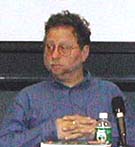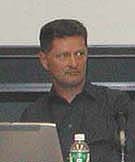| world media and monopolies | |
|
Thursday,
May 9, 2002
5-7 p.m. Building E51 (Tang Center) Room 145 2 Amherst Street Abstract This Forum
is a prelude to the CMS-Communications Forum conference on globalization
and convergence, to be held Friday through Sunday, May 10-12.
The Forum will focus on some of the leading questions to be
explored in panel discussions and plenary conversations during
the weekend conference. Danny Schechter is the executive editor of the MediaChannel.org and co-founder and executive producer of Globalvision, a New York-based television and film production company. Schechter is the author of Falun Gong's Challenge to China, The More You Watch, The Less You Know and News Dissector: Passions, Pieces and Polemics, and the producer and director of numerous TV specials and films.
Noting that about 10 years ago media critic Ben Bagdikian put the number of global media companies at around 50, Schechter said that number has now been consolidated into about five-to-seven companies that "control the media world." "Most of them are in the neighborhood where I work," Schechter continued. "This is not an abstraction for me." Within blocks of his Times Square office, he said, are Bertelsman, ABC, Reuters, Viacom, Rupert Murdoch's offices and NBC. "I am an ant in a field of elephants," he went onto say, "not only trying to understand media in some academic way, but also trying to survive as an independent producer in an environment where you are under-funded and over-controlled." Discussing the dwindling number of global media companies in relation to the explosion in the number of channels available not only on television but through the Internet and radio, Schechter said we have "many channels and a tremendous lack of diversity." In addition to the consolidation of media production, Schechter mentioned that many of the television formats created in America are being exported - that broadcasters in other countries want to look like CNN with their "suits and sets" and that creates a further "narrowing of diversity." "TV was cloning program formats before cloning ever came to MIT," he quipped. Schechter said that as a journalist "looking for a way to talk about things not talked about in the dominant culture," his goal is to "intervene to some degree to ensure more access, a diversity of opinion, in an institution that is democratic - in its spirit, at least." As part of that effort, two years ago Schechter founded the MediaChannel Web site that tracks, collects and analyzes news coverage from around the world. He began the Web site working with twenty news and news-watching organizations, he explained, and that number has grown to over 1,000. The site gets about 3.5 million hits per month, he said. Finally, Schechter told the audience, "Why I came here tonight was to suggest to you that this nexus of issues about media concentration, freedom, and coverage are all at the heart of the democratic challenge ahead. We must solve this problem to solve others."
"My opening statement," Hartley said, "is to ask for as much globalization as possible in this context." To make his point, Hartley held up a recent issue of TV Guide with the banner headline "The 50 Greatest TV Shows Ever," saying that all 50 shows listed were American. "We are in a different environment when talking from the point of view of the consumer," he explained. "We want more globalization, not less." Hartley asked who in the audience had ever heard of Charles Joseph Pancouke, and no one raised a hand. Hartley explained that Pancouke owned most of the newspapers in France during the French Revolution and that "had taken the revolution to the countryside" as the "Rupert Murdoch of his age." He was eventually hanged and few people have heard of him, Hartley said, "but we remember the content of the period." Hartley then asked about Fust and Schoeffer, and he got a similar response. Fust and Schoeffer, he explained, caused Johannes Gutenberg to go bankrupt and took control of his printing press. "The point is," Hartley said, "that it is the Gutenberg Bible we remember, not the firm that owned the press." "Content is relatively independent of ownership in times that matter," he concluded. When you look at content instead of ownership, Hartley said, you move away from the institutions that are organized around scarcity, that are overly competitive and controlling, and toward an organizational model built around choice, voluntary affinities, and customized content for a region, identity, or lifestyle. "Content isn't scarce," he said. "It's plentiful." Furthermore,
Hartley said, the demand for content is not under the control
of the owners - new media technologies have made it possible
for anyone to create and distribute content globally - and therefore
content is not a unidirectional message from owner to consumer.
"Here's a political event," he said, "but what does it mean? Call us and tell us. Who should be thrown off the island? Call us and tell us." Today, Hartley said, "the public sphere is where we find meaning." And this shift toward the audience as a source of meaning is a distinctive feature of contemporary media culture. He imagined a new relationship between consumers and makers: "when the consumer is the center of meaning," media content will be a collaboration, a partnership. "We are currently going through an important historical change," he went on, "that has not shown its full implications yet - the change of content from a read-only, one-way broadcast-era model of communication to communication that is interactive, that is both read and write." Discussion QUESTION: I challenge John's assertion that content is plentiful. If you have plenty of garbage where does that get you? Despite what you said about globalization having been around for a long time, here we are where Americans are told they made the 50 best television shows ever. HARTLEY: This is the rhetoric of contempt for popular television. If we say all stuff that is entertainment is crap and all that is political is good, we are missing the point of television. My point is that we need to start helping viewers to do more with television then they thought possible. SCHECHTER: I am not arguing that the great and the good are better than some sort of entertaining program. You seek out programming that's watchable and doesn't preach at you. But to suggest there's this brave new world of content not affected by bureaucratic institutions isn't real at all. You have to have a political analysis as well as a cultural, and the two complement one another. QUESTION: What are your ideas to foster media literacy? HARTLEY: I think my founding premise is that there has been a break in intellectual culture and poplar culture. And one of the things we need is to encourage greater attention by the intellectual community. They need to get their ideas straight about what's going with such things as the shift in meaning I mentioned. QUESTION: One-sixth of the world is illiterate in a print sense. When you talk about new media literacy, is that possible without print literacy? HARTLEY: Yes, there is clear evidence that indigenous people in Australia are becoming media makers through the use of these new media technologies. These are people who would never open a newspaper. If we say a sixth of the world is not print literate, it does not tell us in what they are literate. SHECHTER: Media literacy is important, but you have to be careful: there is the Channel 1 variety of media literacy in which kids have to watch because the school is getting a free antennae or something and they are seeing 6 minutes of ads for candy bars. But, if you really want to get people engaged there are many ways to do that. QUESTION: Does the new technology really make the media more accessible? SCHECHTER: Yes, I think some technologies make it possible to do some things much cheaper than before, but we don't have those advantages in terms of channels of distribution. HARTLEY: The cost of making television shows about rural and indigenous people is now as low as radio. You can see the technology diffusing and expanding in that sort of way. In Australia, the Australian Broadcasting Corporation has pledged to create diverse programming and they do it by giving video cameras to indigenous people. Part of the answer to your question is to remember is that this is not just about the large-scale stuff. Innovation at the margins will make a difference. --compiled by Brad Seawell |
|

 DANNY
SCHECHTER recalled his career as a journalist and its relationship
to the concentration of media ownership. His career began in
1970 in Boston where he was known as the "news dissector"
on radio and television; he helped to start CNN in 1980; he
spent eight years with 20/20, the ABC magazine-format
news show featuring Barbara Walters and Hugh Downs; and, in
1987, he started
DANNY
SCHECHTER recalled his career as a journalist and its relationship
to the concentration of media ownership. His career began in
1970 in Boston where he was known as the "news dissector"
on radio and television; he helped to start CNN in 1980; he
spent eight years with 20/20, the ABC magazine-format
news show featuring Barbara Walters and Hugh Downs; and, in
1987, he started  JOHN
HARTLEY offered a different perspective on globalization,
analyzing media from the consumer's point of view.
JOHN
HARTLEY offered a different perspective on globalization,
analyzing media from the consumer's point of view.